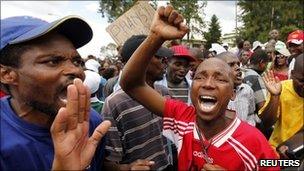Swaziland police disperse Manzini democracy activists
- Published

Police in Swaziland have used tear gas and water cannon to disperse protesters calling for elections in Africa's last absolute monarchy.
The demonstrations were called to mark the 38th anniversary of the banning of political parties.
The authorities have banned the protests and arrested five organisers.
A BBC correspondent in the main city, Manzini, says there were more security agents than civilians on the streets.
The BBC's Nomsa Maseko saw a group of riot police marching up the street singing: "You will get arrested if you dare."
Ahead of the protest, she saw police arresting anyone who approached the venue of the planned protests unless they were on their own.
Mario Masuku, head of the banned opposition People's United Democratic Movement (Pudemo), was put under house arrest, he told the BBC's Focus on Africa programme.
He said his mobile phone had been seized to prevent him from organising the protests.
"People have no confidence in the current government," he said, accusing it of corruption, which had led to declining living standards.
A teaching union spokeswoman accused the police of beating protesters.
A police spokeswoman told the AP news agency that police had fired tear gas after stones were thrown at them.
The organisers say they want the government to resign - to be replaced by a transitional authority - and political parties to be unbanned and allowed to compete for seats in parliament.
Most of the protesters are said to be in the capital, Mbabane, and are unable to get to Manzini, a 45-minute drive away.
There are police roadblocks around Manzini and some bus drivers are refusing to transport the protesters in case they are arrested.
The demonstrations are supposed to last for three days.
Last month, thousands of civil servants held the biggest march in Swaziland for several years, to protest at a pay freeze and demand that the government resigned.
The protesters are keen to stress that they do not want to oust King Mswati III but they want a constitutional monarchy.
The king - who has 14 wives - has been accused of living a lavish lifestyle, while hundreds of thousands live in poverty.
Swaziland has a population of only 1.4 million but 40% of them are unemployed, and 70% of the population is living on less than $1 (75p) a day.
- Published18 March 2011
- Published10 September 2010
- Published20 August 2010
- Published6 September 2008
- Published14 November 2011